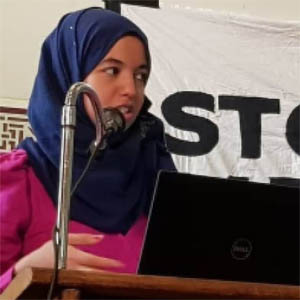
We invite you to engage with Sameena Eidoo and Tasnim Mahmoud Sammak’s recently published article “Sending Balms Across Geographies of Grief: Transoceanic Letters on Muslim Aliveness.” The article will be included in an exciting upcoming special issue guest edited by Fikile Nxumalo and Ligia López López called “Black and Indigenous Futures in Education.”
In this article, co-first authors Eidoo and Sammak engage in an epistolary exchange informed by Kevin Quashie’s slowness as poetics of Black method, Black and Indigenous epistolary methodologies, and the global Free Palestine movement, where “the epistolary form supplements resistance work as artists, writers, students, teachers, university professors, paramedics, nurses, physicians, engineers, lawyers, and others contend with the task of stopping genocides” (p. 17). Eidoo and Sammak build on Quashie’s conceptualization of Black aliveness to consider and theorize Muslim aliveness in the context of “deadly world-altering violence against Muslims” (p. 10) in Quebec City, London (Ontario), Christchurch (Aotearoa), Palestine, and Sudan. Muslim aliveness, they write, “resists violent structures, while envisioning and living into more just futures” (p. 4).
In their exchange, Eidoo and Sammak reflect on bringing Muslim aliveness into their pedagogical practices, including Eidoo’s refusal of “curricular silence” on Palestine and Sammak’s assertion that: “We need to be teaching on Palestine, on refugee bans, with situated knowledge that enables us to respond to the political problems saturating our minds, our students’ minds” (p. 14).
In their conclusion, Eidoo and Sammak write: “Our insistence on fostering re-humanisation through offering slow ontology in the face of accelerated militarised violence may seem ineffective, yet as critical educators we see that liberatory possibility lies in classrooms that can function on an alternative sense of time and productivity to that set by those in power” (p. 17).
Link: Sending balms across geographies of grief: Transoceanic letters on Muslim aliveness: Curriculum Inquiry: Vol 0, No 0 - Get Access
About the Authors

Sameena Eidoo (she, her) is an award-winning educator and researcher. She is an Assistant Professor in the Department of Curriculum, Teaching, and Learning, Ontario Institute for Studies in Education, University of Toronto. Born and raised in Mississauga, Sameena is Muslim with roots in India. She identifies as part of Muslim and South Asian Diasporic communities. Her work is interdisciplinary, and her interests encompass critical race theory, cultural studies, foresight and futures studies, global Islam, narrative change, solidarity, transnational feminism, and youth activism. She is the author of Shaping Muslim Futures: Youth Visions and Activist Praxis (2021), a non-fiction book that amplifies the counter-narratives of activist Muslim youth living into their desired futures, and creates space for readers to clarify their own. The book is featured on the Canadian Council of Muslim Women’s Islamic Herstory Month Reading List. Sameena is the Principal Investigator of a SSHRC-funded study focusing on Muslim narrative change in film and television.

Tasnim Mahmoud Sammak is a PhD candidate at Monash University’s Faculty of Education, a single mum of two boys and a local Palestinian Muslim organiser in Naarm (Melbourne). Her research examines and theorises the emergence of 9/11 political subjectivities through counter-storytelling journeys of learning. She is a teaching associate at Monash University and the University of Melbourne.